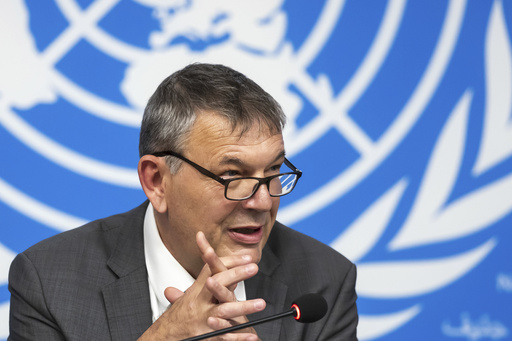
The leader of the United Nations agency dedicated to assisting Palestinian refugees has raised significant concerns regarding newly enacted Israeli legislation that restricts its operations within Israel. Philippe Lazzarini, the commissioner-general of the United Nations Relief and Works Agency (UNRWA), warned that the new laws could have dire consequences, leading to increased instability and loss of life in both Gaza and the West Bank. In a recent interview, he stated that these measures ultimately harm the Palestinians by obstructing their access to crucial services such as healthcare and education.
UNRWA has been instrumental in providing aid within the Gaza Strip, where nearly 2.3 million Palestinians depend on its support for basic necessities, especially amid the ongoing conflict with the militant group Hamas, which has persisted for almost 13 months. Thousands of displaced individuals are currently taking refuge in schools operated by the agency, which is noted for its long-standing and effective infrastructure across Gaza. As of now, Israel has not presented any alternative plans to distribute essential supplies like food and medicine should UNRWA be forced to cease operations.
Israel has accused Hamas and other armed groups of exploiting UNRWA facilities and diverting aid, although it has not substantiated these claims with concrete evidence. The recent parliamentary decision effectively severs Israel’s relationship with UNRWA, prohibiting its operations in Israel and potentially affecting its activities in the West Bank and Gaza due to the dependence on coordination with Israeli authorities. The new laws are anticipated to take effect in three months.
In his remarks, Lazzarini emphasized that if Israel follows through with the termination of UNRWA’s work, it would result in catastrophic outcomes, comparable to “throwing out the baby with the bathwater.” He highlighted that such a vacuum would exacerbate existing instability in the region, foreseeing an increase in mortality rates in Gaza. The agency is currently exploring innovative methods to continue its essential services and is urging the United Nations General Assembly and international donors for help. Lazzarini also called on Israel to reconsider its decision or extend the three-month period before it takes full effect, noting that official communication has been lacking since the laws were passed.
UNRWA has, for many years, established a network of schools, health facilities, and related services across Gaza and the West Bank, as well as in neighboring countries such as Lebanon, Syria, and Jordan. In Gaza, the agency serves as the largest employer and is vital to the delivery of educational and health services. The impending legislative changes threaten to dismantle these operations, which would have profound implications for the welfare and education of countless children in the region. According to Lazzarini, a large portion of Gaza’s population consists of children under 18, including around 650,000 minors living in dire conditions, further traumatized by the ongoing crisis. He remarked that eliminating UNRWA’s presence effectively communicates a bleak message to these youths—that their educational futures are at risk, as education remains one of the few constants in the lives of many Palestinians.
UNRWA was established in the aftermath of the 1948 war, which resulted in the displacement of approximately 700,000 Palestinians. Today, it continues to support both the original refugees and their descendants, currently numbering around 6 million across the region. Lazzarini criticized the Israeli legislation as part of a broader campaign to undermine UNRWA, stating that its intent is to eliminate the recognition of Palestinians’ refugee status.
International law affirms the right of Palestinian refugees and their descendants to return to their ancestral homes, a claim that Israel rebuffs, arguing it would disrupt the demographic balance of the nation. Instead, Israeli officials assert that these refugees should integrate into their host countries, positioning UNRWA’s services as an impediment to that goal. In an official correspondence to the U.N., Lazzarini noted that while the Israeli actions may not abolish the Palestinian refugee status, which exists independently of UNRWA’s existence, they will undoubtedly inflict severe damage on the lives and futures of Palestinian individuals.
Israel claims that numerous Palestinian militants are employed by UNRWA and has linked some of its staff to the recent attack by Hamas on October 7, 2023, which rekindled the current conflict. In response, the U.N. has dismissed several staff members based on findings from internal inquiries. With nearly 30,000 employees across the region—approximately 13,000 of whom are in Gaza—UNRWA continues to face scrutiny. Israel contends that Hamas operatives utilize UNRWA facilities, having attacked many of these sites with airstrikes.
Lazzarini has stated that UNRWA has not knowingly facilitated armed groups and has taken steps to remove any suspected militants. He added that Israel has not provided details on its allegations, which prevents UNRWA from addressing these claims, and he has called for an independent investigation into the matter.
The ongoing war in Gaza has resulted in significant casualties among UNRWA staff, with at least 237 reported deaths—an unprecedented toll among U.N. personnel in any conflict. Additionally, over 200 of the agency’s facilities have sustained damage or destruction, leading to fatalities among the civilians sheltering there. Lazzarini expressed his views during a conference organized by the Global Alliance for a Two-State Solution, which was established by the Saudi government and attended by foreign ministers from various countries.
He concluded by stating that any potential future political transition necessitates the presence of an agency like UNRWA to ensure the ongoing education and healthcare of Palestinian refugees until a functional state or governing body can assume those responsibilities.
